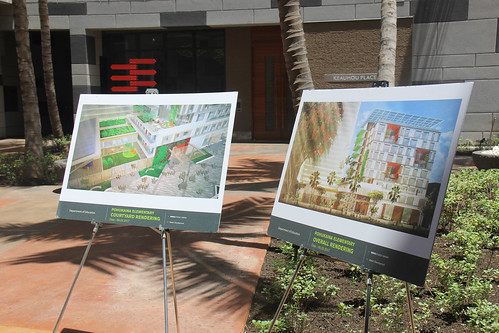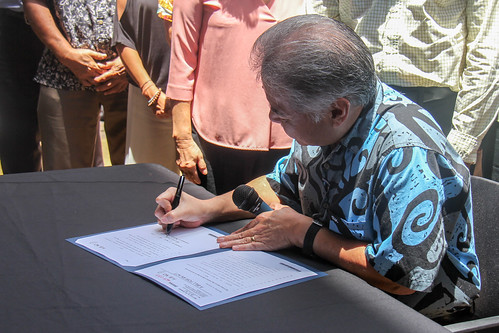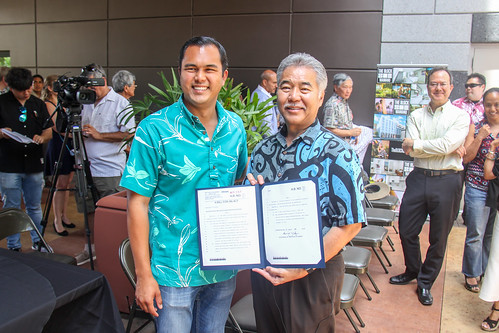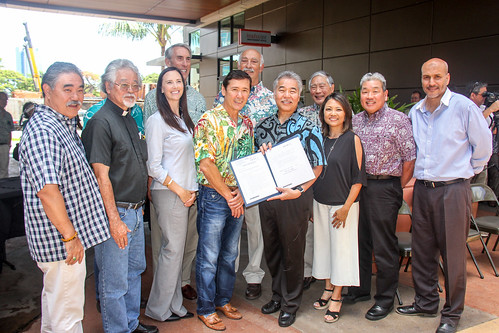Gov. Ige Signs Bill to Boost Production of Affordable Rental Housing
Flanked by housing advocates, builders, and lawmakers in Kaka‘ako, Gov. David Ige signed a comprehensive housing measure aimed at increasing the production of affordable rental units across the state.
HB2748 appropriates $200 million to the Hawai‘i Housing Finance and Development Corporation’s (HHFDC) Rental Housing Revolving Fund, and $10 million to the HHFDC’s Dwelling Unit Revolving Fund (DURF). The bill also extends the general excise tax exemption for certain affordable rental housing projects from June 30, 2022 to June 30, 2026, and increases the cap on GET exemptions to $30 million per year until 2030.
“Housing has been a top priority for my administration from day one,” said Gov. Ige. “We have been advocating for increased investment in the Rental Housing Revolving Fund for nearly four years now. I’m so glad that the Legislature is funding these very important programs that we have been advocating for.”
Since 2014, when Gov. Ige took office, the state has completed 5,300 new homes statewide, including 2,000 affordable homes. There are an additional 1,400 units under construction, and another 4,000 units in the planning phase.
In Kaka‘ako, an urban redevelopment area, housing production is up 500 percent since 2014 – with 1,100 units built each year, compared to 200 units a year over the last 30 years.
The $200 million provided by this bill will enable the HHFDC to generate an additional 1,600 affordable units.
“The collaborative efforts of the community – from developers to builders, housing advocates and our legislators – is enabling the state to help our families realize their dream of having their own home,” Ige said. “A stable home is the foundation for a stable and successful life. Our goal is within reach. Let’s continue to work together to build upon this momentum.”
HB2748 becomes Act 39 with the governor’s signature.
The Hawai‘i House of Representatives stated:
A momentous step forward in addressing Hawai‘i’s affordable rental housing crisis on all islands was taken by the Legislature this session with the passage of House Bill 2748 HD2 SD2 CD1 and today that bill was signed into law by Gov. David Ige.
The bill provides a total of $570 million which will generate more than 25,000 affordable units by the year 2030. This will fulfill the goal of 22,500 affordable rental housing units set by the Legislature in 2016 via Act 127, Session Laws of Hawaiʻi 2016.
“I want to thank everyone involved for having the courage to take this historic action to provide affordable housing so desperately needed in Hawai‘i,” said House Housing Chair Representative Tom Brower (Waikīkī, Ala Moana). “This is an investment in the future that will allow our working families a chance to save money to buy a home of their own and will contribute to lawmakers’ efforts to end homelessness.
“Former State Senators Will Espero and the Rev. Bob Nakata deserve recognition for working to make this bill a reality along with Representative Della Au Belatti and the House and Senate leadership for standing behind this rental housing bill that will improve the lives of so many residents.”
This measure supports development of affordable rental housing for a wide range of households spanning low income families to those making up to 140 percent of the area median income (AMI). House Bill 2748 HD2 SD2 CD1 contains four parts:
- 1. Appropriates $200 million into the Rental Housing Trust Fund to generate approximately 1,600 affordable rental housing units for families at or below 80 percent AMI.
The Rental Housing Revolving Fund (RHRF) provides equity gap low-interest loans or grants to qualified owners and developers for the development, pre-development, construction, acquisition or preservation of affordable rental housing. Preference is given to projects that meet certain statutory criteria. Included is a preference for projects that provide at least 5 percent of the total number of units for persons and families with incomes at or below 30 percent of the median family income. Another preference is for projects that provide the maximum number of units for persons or families with incomes at or below 80 percent of the median family income.
At the end of Fiscal Year 2017, the RHRF had a balance of $156 million. This appropriation will more than double its corpus to assist low income families and individuals, including the homeless and special needs groups, in obtaining affordable rental housing.
- 2. Expands the general excise tax exemption for construction of approximately 24,000 affordable rental units for families at or below 140 percent AMI.
The measure increases the general excise tax exemption for the construction of affordable rental units for households at or below 140 percent AMI, with at least 20 percent of those units available for households at or below 80 percent of the AMI. The exemption will increase from $7 million (the exemption amount enacted in 2017) to $30 million per year and will be extended from the year 2022 to 2030. The total value of this expanded general excise tax exemption amounts to $360 million over 12 years.
This exemption is expected to result in the construction of approximately 24,000 affordable rental units.
- 3. Appropriates $10 million into the Dwelling Unit Revolving Fund (DURF)
DURF was established pursuant to Act 105, Session Laws of Hawai‘i 1970, which authorized the issuance of $125 million in general obligation bonds to carry out the purposes of the Housing Development Program. Funds may be used for the acquisition of real property; development and construction of residential, commercial and industrial properties; interim and permanent loans to developers; and any and all things necessary to carry out the purposes of the Housing Development Program, including administrative expenses.
DURF provides interim construction financing of affordable housing projects. This appropriation will increase its corpus by 10 percent.
- 4. Appropriates $50,000 to prepare an assessment of housing needs for persons with low or no income, such as the disabled and functionally challenged populations.
This appropriation commissions the Hawai‘i Housing Finance and Development Corporation to determine the number of persons with special needs in Hawai‘i, identify the supportive services they may require and inventory the providers of supportive services statewide.













